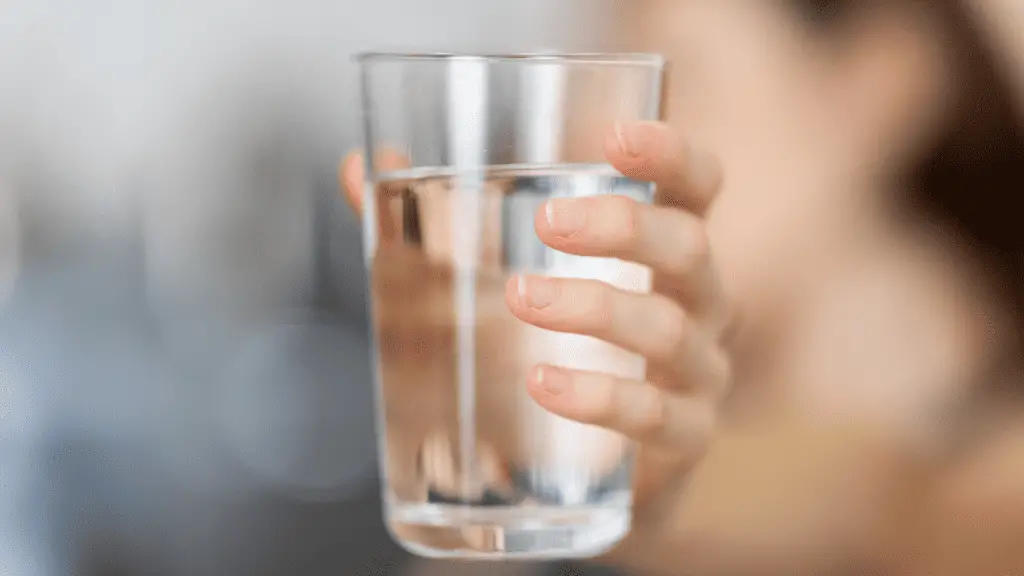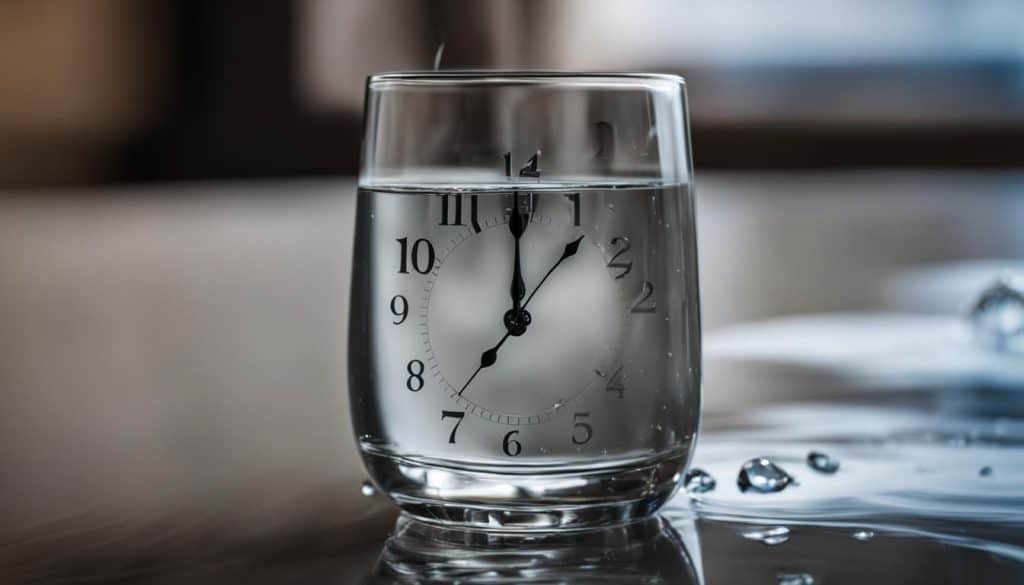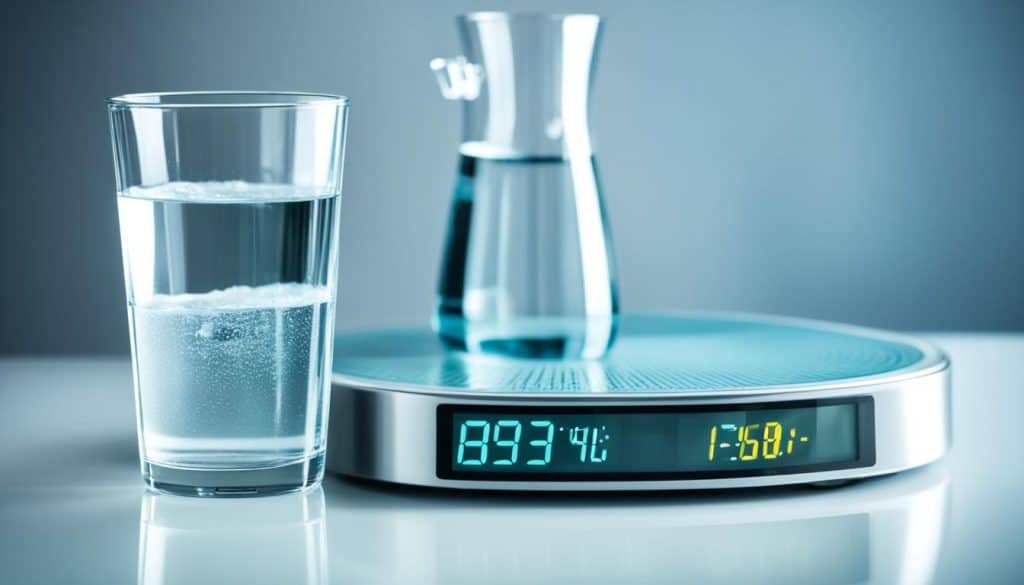
Intermittent fasting has gained popularity as an effective diet for weight loss and overall health. But what about staying hydrated during the fasting period? Can you drink water while intermittent fasting? The answer is yes! In fact, water intake during intermittent fasting is not only allowed but encouraged for optimal health and well-being.
Hydration and intermittent fasting go hand in hand. During the fasting window, it is important to stay hydrated to prevent dehydration and ensure your body functions optimally. While fasting, you can consume water and other zero-calorie beverages to quench your thirst without disrupting the fasting state.
Key Takeaways:
- Water and other zero-calorie beverages are generally acceptable during intermittent fasting.
- Staying hydrated during fasting can prevent dehydration and help avoid symptoms like headaches, muscle cramps, and fatigue.
- Choose water brands that do not remove natural minerals or contain demineralized water for optimal hydration.
- Mineral water is another calorie-free option that can help maintain electrolyte balance.
- Drinking diluted apple cider vinegar can be beneficial during fasting as it may help suppress appetite.
The Benefits of Staying Hydrated During Intermittent Fasting
Staying hydrated during intermittent fasting has numerous benefits that contribute to overall health and well-being. Proper hydration is essential for maintaining optimal bodily functions and maximizing the potential benefits of intermittent fasting. Let’s explore some of the key advantages of staying hydrated during fasting periods.
Preventing Dehydration and Associated Symptoms
One of the primary benefits of staying hydrated during intermittent fasting is the prevention of dehydration and the symptoms that come with it. Dehydration can lead to headaches, muscle cramps, dizziness, and fatigue, which can negatively impact your fasting experience. By consuming enough water and other zero-calorie beverages, you can ensure that your body remains adequately hydrated throughout the fasting period, reducing the risk of these symptoms.
Supporting Weight Loss Efforts
If weight loss is one of your goals during intermittent fasting, staying hydrated becomes even more crucial. Proper hydration can promote feelings of satiety, preventing overeating and supporting your weight loss efforts. Additionally, staying hydrated aids in fat burning and supports healthy digestion, both of which are essential for achieving and maintaining a healthy weight.
Improving Fasting Performance
Hydration plays a vital role in fasting performance. When you’re adequately hydrated, your body functions optimally, providing you with the energy and stamina needed to carry out your daily activities, including workouts. By staying hydrated, you can enhance your exercise performance, push harder during workout sessions, and achieve better results.
| Benefits of Staying Hydrated During Intermittent Fasting |
|---|
| Prevents dehydration and associated symptoms such as headaches, muscle cramps, dizziness, and fatigue |
| Supports weight loss efforts by promoting feelings of satiety, aiding in fat burning, and supporting healthy digestion |
| Improves fasting performance by providing energy and enhancing exercise capabilities |
The Role of Water in Intermittent Fasting
Water plays a crucial role in the effectiveness of intermittent fasting. As a zero-calorie beverage, water does not disrupt the fasting state, making it an ideal choice during fasting periods. But why is water so important?
First and foremost, drinking water during intermittent fasting can increase feelings of satiety. This means that water can help you feel fuller for longer, reducing the temptation to snack or overeat. By staying hydrated with water, you can better control your calorie intake and support your weight loss goals.
In addition to its satiating effect, water also aids in fat burning. When your body is dehydrated, it can struggle to efficiently metabolize stored fat. By consuming adequate amounts of water, you optimize your metabolic processes, allowing your body to effectively burn fat for energy.
Moreover, water is essential for digestion, which is why it plays a significant role in intermittent fasting. Proper hydration supports the breakdown and absorption of nutrients, ensuring that your body can efficiently extract and utilize the essential components from the food you consume during your eating window. By staying hydrated, you promote healthy digestion and enhance nutrient absorption.
Staying hydrated with water also helps prevent constipation and bloating, which are common discomforts that can arise during intermittent fasting. Water keeps your digestive system running smoothly, ensuring that waste moves easily through your intestines. This can help alleviate any digestive issues and contribute to your overall well-being.
Furthermore, water provides the energy and focus you need to stick to your fasting schedule and make healthy choices. Dehydration can lead to fatigue, headaches, and decreased cognitive function, making it challenging to maintain your fasting routine. By drinking water, you support mental clarity and sustain the energy necessary for a successful fasting period.
Overall, water is an essential tool in optimizing the benefits of intermittent fasting. Its role in increasing satiety, promoting fat burning, aiding digestion, preventing discomfort, and boosting energy levels cannot be understated. By prioritizing proper hydration, you can maximize the positive effects of intermittent fasting on your weight loss journey.

| Benefits of Water in Intermittent Fasting | How Water Supports Intermittent Fasting |
|---|---|
| Increases feelings of satiety | Aids in fat burning |
| Supports healthy digestion | Prevents constipation and bloating |
| Enhances nutrient absorption | Provides energy and focus |
| Optimizes the benefits of intermittent fasting | |
Water Consumption and Weight Loss during Intermittent Fasting
When it comes to weight loss during intermittent fasting, water consumption plays a significant role. Drinking water while fasting can have a positive impact on your weight loss journey. Here’s how:
Promotes Feelings of Fullness and Calorie Reduction
Water is a calorie-free beverage that can help promote feelings of fullness, reducing the urge to snack or overeat during fasting periods. By staying hydrated with water, you can better manage your calorie intake and support weight loss efforts.
Boosts Metabolism and Supports fat-burning
Proper hydration is essential for efficient metabolism and fat burning. Drinking water can help increase your metabolism rate, allowing your body to burn calories more effectively. This can contribute to more significant weight loss results during intermittent fasting.
Prevents Water Retention and Bloating
Dehydration can lead to water retention, causing bloating and temporary weight gain. By staying adequately hydrated with water, you can prevent water retention and promote a leaner appearance.
Supports Digestion and Optimal Exercise Performance
Water plays a crucial role in digestion and nutrient absorption. By consuming enough water, you can support the digestive processes during intermittent fasting, ensuring your body efficiently breaks down and absorbs nutrients. Additionally, staying hydrated enhances exercise performance by providing the necessary fluid balance for optimal physical activity.
To maximize the benefits, ensure you drink enough water throughout the day, especially during fasting periods. Pay attention to your body’s signals of thirst and aim to drink water regularly.

Staying hydrated with water is a simple yet effective way to support your weight loss goals during intermittent fasting. By incorporating regular water consumption into your fasting routine, you can enhance fat burning, promote feelings of fullness, and improve overall well-being. In the next section, we’ll discuss other suitable beverages to consider during intermittent fasting.
Other Drinks to Consider and Avoid During Intermittent Fasting
In addition to water, there are several calorie-free drinks that you can enjoy during your intermittent fasting journey. These beverages not only help keep you hydrated but also add variety to your fasting routine. Here are some acceptable beverages to consider:
- Mineral water: With its natural minerals, mineral water can support electrolyte balance and keep you refreshed.
- Seltzer: This fizzy and flavorful option provides a refreshing alternative to plain water.
- Teas: Herbal teas and unsweetened green or black teas offer a pleasant, calorie-free option. Plus, they can provide additional health benefits, such as antioxidants.
- Black coffee without cream or sugar: If you’re a coffee lover, you can enjoy a cup of black coffee without compromising your fasting window. Just be careful not to add any cream, milk, sugar, or artificial sweeteners.
- Diluted apple cider vinegar: Apple cider vinegar, when diluted in water, can be a refreshing and potentially appetite-suppressing beverage during fasting periods.
These drinks do not contain calories and are generally considered acceptable while fasting.
On the other hand, there are certain drinks that you should avoid during your fasting window, as they can break your fast due to their calorie content or artificial sweeteners. Here are some examples:
- Diet sodas: Although labeled as “diet,” these beverages often contain artificial sweeteners that can disrupt the fasting state.
- Milk: Dairy milk contains calories and can break your fast. However, small amounts of unsweetened plant-based milk, such as almond milk, may be an alternative.
- Bone broth: While bone broth is a nutritious option outside of fasting periods, it typically contains calories and should be avoided during fasting.
- Coconut water: Although refreshing, coconut water contains natural sugars and calories, which can interrupt your fasting state.
- Fruit juices: Most fruit juices, even those without added sugar, are high in natural sugars and can significantly impact your fasting goals.
- Alcohol: Alcoholic beverages should be avoided during fasting periods, as they contain calories and can affect blood sugar levels.
It’s important to carefully read labels and choose natural, zero-calorie options during your fasting window to ensure you stay on track.
Note: Be cautious when consuming drinks listed as “zero calories” or “calorie-free” as some may contain artificial sweeteners or additives that can disrupt your fasting state. Always check the ingredients list to ensure they align with your fasting goals.
Conclusion
Drinking water during intermittent fasting is not only acceptable but also crucial for maintaining hydration throughout the fasting period. Water does not disrupt the fasting state or undermine the potential benefits of intermittent fasting. By staying properly hydrated, individuals can experience a range of advantages, including increased satiety, support for fat burning, improved digestion, and enhanced exercise performance.
Choosing zero-calorie beverages, such as water, mineral water, teas, and black coffee without cream or sugar, ensures that the fasting state is preserved while still allowing for hydration. It is essential to avoid drinks that contain calories or artificial sweeteners, as they can interfere with the fasting process.
As you embark on your fasting journey, incorporating water and other suitable beverages into your routine will help you stay refreshed and support your weight loss goals. Remember to stay hydrated and make informed choices when it comes to your beverage selection during intermittent fasting.
FAQ
Can you drink water while intermittent fasting?
Yes, water is generally acceptable to consume during fasting periods as it does not disrupt the fasting state.
Why is water intake important during intermittent fasting?
Staying hydrated during intermittent fasting is crucial to prevent dehydration, headaches, muscle cramps, dizziness, and fatigue.
What are the benefits of staying hydrated during intermittent fasting?
Proper hydration during fasting can support weight loss efforts, promote feelings of satiety, aid in fat burning, and improve digestion and exercise performance.
What is the role of water in intermittent fasting?
Water plays a crucial role in supporting metabolic processes, including the breakdown of fats and carbohydrates, as well as maintaining electrolyte balance.
Can drinking water help with weight loss during intermittent fasting?
Yes, drinking water during intermittent fasting can boost metabolism, support fat burning, aid in calorie reduction, and promote feelings of fullness.
What other drinks can be consumed during intermittent fasting?
Other suitable calorie-free beverages include mineral water, seltzer, teas, black coffee without cream or sugar, and diluted apple cider vinegar.
What drinks should be avoided while intermittent fasting?
It is advisable to avoid drinks that contain calories or artificial sweeteners, such as diet sodas, milk, bone broth, coconut water, fruit juices, and alcohol.
Source Links
- https://www.ehproject.org/nutrition/diet/what-drink-during-intermittent-fasting
- https://www.healthline.com/nutrition/can-you-drink-water-when-fasting
- https://www.healthifyme.com/blog/water-during-intermittent-fasting/
Hey there, I’m Luke, and I’ve been immersed in the fitness world since 2007. From gym floors to running my own personal training business, I’ve seen it all. My journey led me to study Sports Science at university, where I deepened my understanding of the science behind exercise.
One thing that truly lights my fire? High-Intensity Interval Training (HIIT). It’s not just a workout; it’s a game-changer. I’ve used HIIT to help countless men and women shed weight and transform their lives for the better.
Through my personal training business, I’ve witnessed the incredible impact of HIIT on both physical and mental well-being. It’s not just about getting fitter; it’s about feeling stronger, more confident, and more resilient.
Join me on this journey to a healthier, happier you. Let’s crush those goals together!